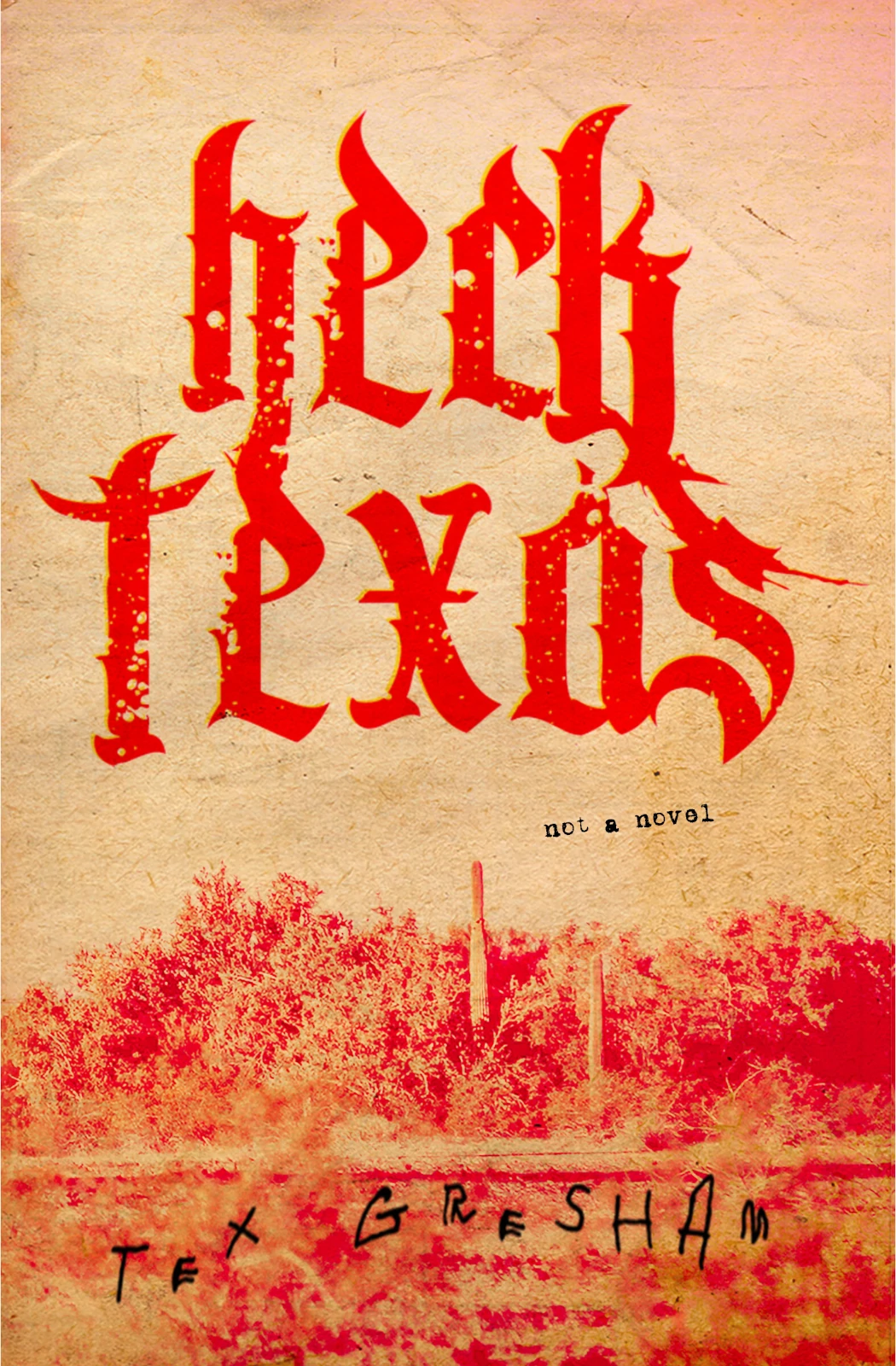
A Review of Heck, Texas by Tex Gresham
Words By Thomas Chisholm
Published September 4, 2020 by Atlatl Press
Heck, Texas is not a novel. The cover even says so. It’s a fairly short work of fiction by Tex Gresham, who also wrote the excellent nonfiction piece “Matchstick 66” published in F(r)iction #15. The book is 125 pages of experimental fiction, so I’m pretty sure that the “not a novel” description excludes novellas as well. Heck, Texas is more like a joke book. A very bleak, disturbing, and yet creative joke book. There isn’t much in the way of narrative cohesion. Instead, the book uses a series of vignettes to illustrate life in heck-on-Earth, Texas. Based on geographical locations in the book, Heck, TX seems to be between Houston and the Louisiana boarder.
The text is generally chaotic, with the rules of writing and style completely thrown aside. Capital letters and punctuation are for the birds, while ampersands abound. Brief lines of verse break up the onslaught of violence and abuse in each vignette. Occasionally, a photograph or drawing will break up the text, while the different typefaces for the vignettes keep the reader aware that the stories are disconnected in time and space.
The book is divided into three sections. The first two are entirely made up of these disjointed vignettes. The third is the closest Heck, Texas comes to a conventional plot and character arc. This section is written like a screenplay, where a madman named Ishmael journeys through town burglarizing houses, screwing with pedestrians, haunting storage units, and evading authority.
Most characters exist on the fringes of society: they’re poor, they’re ugly, they’re addicts, they’re suffering. The way they’re described is as though they are unwritten song titles from the deranged southern metal band The Tony Danza Tapdance Extravaganza: “this is in the back of his car––kick drum with torn head, empty pack of newports, nine unused spiral notebooks, book about the coulthurst murders in alaska, & a gallon of eggnog.”
Most of the stories are tragic, and the ones that aren’t end with a cruel joke at the character’s expense. For example, one character is at a club one night and slips into an existential crisis. His stream of consciousness covers meaning, solipsism, beauty, and living in the present. He comes to some profound realizations. Once he’s finished rambling, a stripper asks him, “Okay, but like do you want a lapdance or not?”
It’s a foul-mouthed book, with plenty of offensive language and slurs. But the bad language illustrates the closed-minded and ignorant people that inhabit Heck, TX. I’m reminded of Mid90s, a 2018 film that took some flak for using homophobic slurs. The movie depicted a specific youth culture and time where what is now considered hate speech was common vernacular. In the same way, Heck, Texas is simply holding up a mirror to the worst parts of Americana.
I give Gresham a lot of credit for a book this nasty being his debut. If you’re the type of person that can find humor in the macabre, if there’s a streak of misanthropy in you, if you’ve been desensitized to violence by a supremely violent culture, then this book might be for you. If you’re easily offended, if you’re an empath who feels all pain, and you don’t enjoy immature toilet humor, then this book definitely ain’t for you. The seventh page of the book even ends with a footnoted warning: “to continue with more shit like this, turn the page[.] to stop reading shit like this, burn the book[.]”
I like Heck, Texas for the same reason I like the music of Father John Misty. Both completely own their shit. Josh Tillman as Father John Misty is a self-absorbed asshole know-it-all. He indulges that side of himself and owns his flaws, giving honesty and authenticity to his music. Tex Gresham has written a book that is so crass and vile in a political climate where making racy jokes is not welcome, but he also owns what he likes. He finds humor in pain, in body horror, and reminds readers that what is taboo does not have to be off-limits. A lot of readers will only see the offensive stories in this book at face value. They won’t spend time trying to understand why someone wrote such a disturbing comedy: Heck, TX exists all over the United States.
Eight years ago, my house caught on fire. When I walked inside the next day and saw how wrecked my living room was, I blurted out laughing and disturbed the insurance agent who was walking around with my landlord. Heck, Texas is like that. In a world, a town, a culture so sick, all you can do is laugh. Heck, Texas is, as Anthony Fantano once so eloquently said, “the feel terrible hit of the summer.”